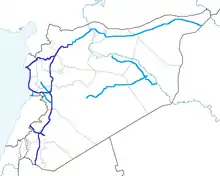Transport in Syria is possible by rail, road, air or rivers, both public and private. Syria is an Asian country with a well-developed rail network (2,052 km) and a highway system (782 km). Main international airport is the Damascus International Airport in the capital, Damascus.


Railways
total:
2,052 km
standard gauge:
1,801 km of 1,435 mm (4 ft 8+1⁄2 in) gauge
narrow gauge:
251 km of 1,050 mm (3 ft 5+11⁄32 in) gauge (2006)
Railway links with adjacent countries
Developments
- On 22 April 2005 Syria ratified the Agreement on International Railways in the Arab Mashriq, which provides for the implementation of a variety of north–south and east–west links between the states of the region, including the restoration of direct rail links between Syria and Lebanon and Iraq.
- On 7 July 2005 the Syrian General Establishment for the Hejaz Railway announced that it had signed a contract worth US$54 million with a Lebanese company to build a railroad between Damascus and Damascus International Airport.
- 2007 - proposed high-capacity public metro system in Damascus.[2]
- 2008 - proposed joint rolling stock factory with Turkey at Aleppo[3]
- 2023 - the restoration of the rail link with Iraq (IRR) and the proposal to extend the railway from Al-Qaim in Iraq through Al-Bukamal in Syria to Homs for a total distance of 270 kilometers and thence to Tartus are under discussion.[4][5]
Road transport
An overland trans-desert bus service between Beirut, Haifa, Damascus and Baghdad was established by the Nairn Transport Company of Damascus in 1923.[6]
Roads

total:
68,157 km
paved:
61,514 km (including 1,103 km of expressways)
unpaved:
6,643 km (2006)
Motorways
Syria has a well-developed system of motorways in the western half of the country. The eastern part nevertheless has only connection through two lanes roads due to the sparsity of the population. The main motorways in Syria are the following:
- M1 - Runs from Homs to Latakia. It also connects Tartus, Baniyas and Jableh. Its length is 174 km.
- M2 - Runs from Damascus to Jdeidat Yabous, on the border with Lebanon. It also connects Al-Sabboura. Its length is 38 km.
- M4 - Runs from Latakia to Saraqib. It also connects Arihah and Jisr al-Shughur. Its length is 120 km. Assuming that it shares some 60 km with the Motorway M5, it arrives until Aleppo, and from there, it has been expanded as a two-lane expressway that continues further east into the Iraqi border, ultimately reaching its destination at Mosul.
- M5 - This is the most important motorway in the country,[7] due to its length and as it functions as the south–north backbone of the country network. It connects the border with Jordan in the south with Damascus, the capital, and continues further north to Aleppo, the country's second largest city. Its length is 450 kilometres (280 mi).[8][9]
- M20 - Also known as Desert Highway. Runs from Tadmur to Deir ez-Zor, it also connects Al-Sukhnah. Its length is 203 kilometres (126 mi).
Developments
- 2022 - proposed east–west highway between Syrian–Iraqi border (Abu Kamal) and Tartus through Homs.
- 2023 - proposed north–south highway linking the Syrian-Turkish border in the north with the Syrian-Jordanian border in the south through Aleppo, Homs and Damascus.[10]
Waterways
- 900 km; minimal economic importance
- Main water artery of Syria is Euphrates.
Pipelines
- crude oil 1,997 km; petroleum products 3,161 km (2010)
- Arab Gas Pipeline, Iran–Iraq–Syria pipeline, Kirkuk–Baniyas pipeline
Ports and harbors
Main international seaport at Latakia with additional ports at Baniyas, Jablah, and Tartus.
Merchant marine
total:
19 ships (1,000 gross tonnage (GT) or over) totaling 429,005 GT/626,069 tonnes deadweight (DWT)
ships by type:
bulk carrier 4, cargo ship 14, carrier 1 (2010)
Airports
As of 2012, Syria had a total of 99 airports. The major airports are: Aleppo International Airport, Bassel Al-Assad International Airport, Damascus International Airport, Deir ez-Zor Airport, Kamishly Airport, and Palmyra Airport.[11]
Airports (with paved runways)
total: 29
over 3,047 meters in length: 5
2,438 to 3,047 meters: 16
914 to 1,523 meters: 3
under 914 meters: 5
Airports (with unpaved runways)
total:
70
1,524 to 2,437 m:
1
914 to 1,523 m:
14
under 914 m:
55 (2012)
See also
References
- ↑ "Syria — Transportation".
- ↑ "Damascus Metro".
- ↑ Africa, Railways. "Railways Africa". Railways Africa.
- ↑ Majda Muhsen, Anoop Menon (9 June 2022). "Iraq and Syria discuss railway link". Zawya project. Retrieved 8 September 2022.
- ↑ "Iran and Iraq again agree to connect their railway networks". www.al-monitor.com. Retrieved 2022-09-11.
- ↑ The Nairn Way Archived 2014-04-29 at the Wayback Machine by John M. Munro and Martin Love in Saudi Aramco World, July/August 1981, Vol. 32, No. 4. Retrieved 28 April 2014.
- ↑ "The M5 highway of death is the key to controlling Syria". The M5 highway of death is the key to controlling Syria.
- ↑ Karam, Zeina (14 February 2020). "AP Explains: Why Syria's M5 is Assad's highway to victory". Associated Press. Retrieved 6 March 2020.
- ↑ "Highway Linking Largest Syrian Cities Reopens After Eight Years". Haaretz. Associated Press. 22 February 2020. Retrieved 13 March 2020.
- ↑ Bushra Dabin/Shaza Qriema (29 May 2023). "Syria- China discuss developing transport cooperation". Syrian Arab News Agency. Retrieved 30 May 2023.
- ↑ "New Damascus International Airport". centreforaviation.com. Retrieved 17 June 2022.
